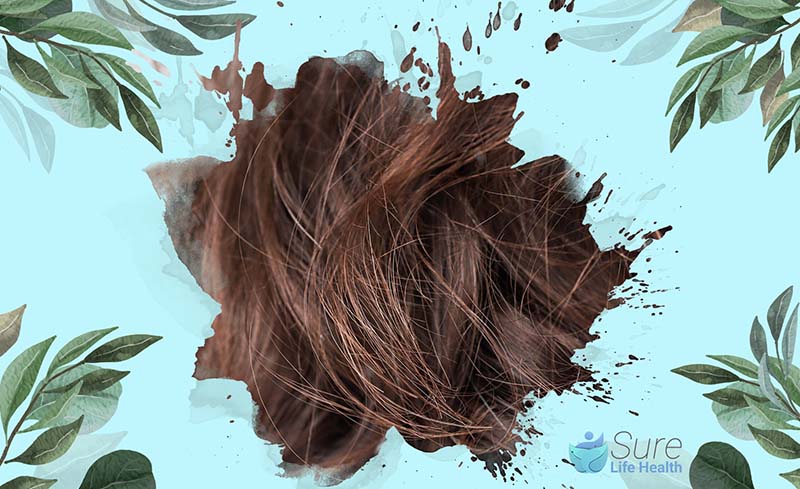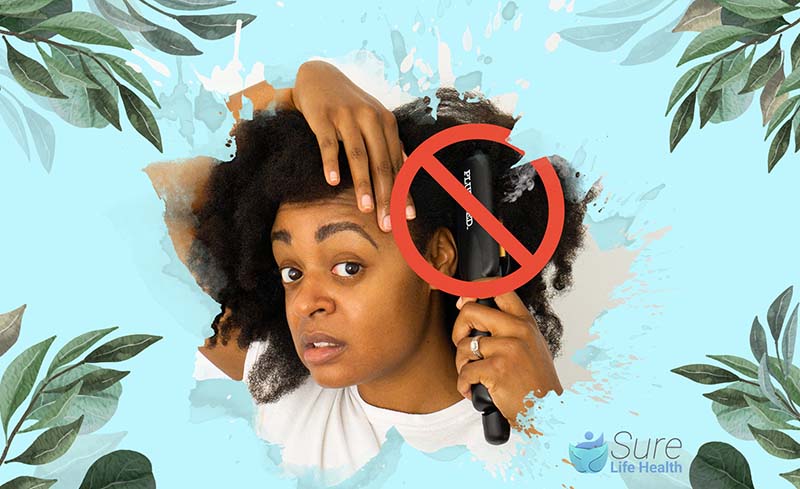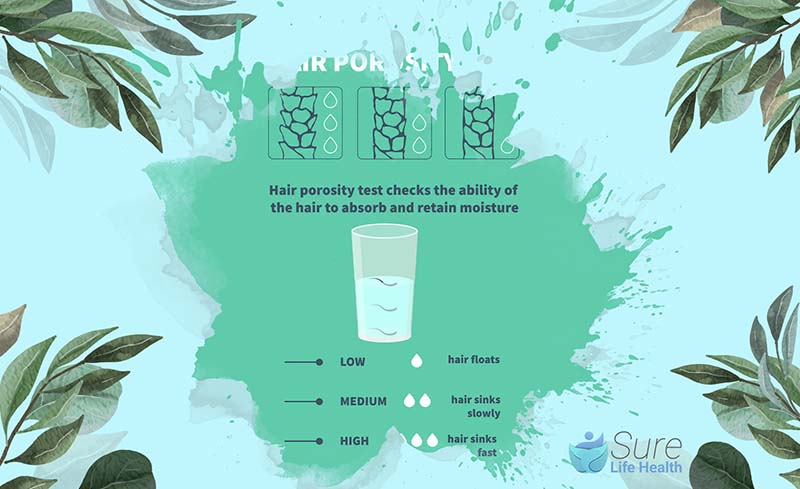Ever wonder why some people’s hair absorbs moisture like a sponge while others struggle to retain it? The key lies in understanding hair porosity.
Today, we’re focusing on high porosity hair, which can present challenges due to its tendency to stay dry, become frizzy, and tangle easily. This blog post will guide you through the signs of high porosity hair and provide valuable tips for nurturing and maintaining its health.
You might ask, “Is High Porosity Hair Bad?” Not necessarily. By exploring the essentials of managing high porosity hair, you can transform your hair care approach and significantly improve the health and appearance of your locks!
What Is High Porosity Hair?
High porosity hair is characterized by a lifted cuticle layer, creating gaps or pores on the surface of the hair. This structure allows moisture to easily penetrate the cuticle and reach the cortex, but it also means that the hair struggles to retain moisture.
Imagine high porosity hair as a sponge. When submerged in water, it quickly absorbs a lot of moisture, but it doesn’t hold onto it for long and soon dries out.
Typically, high hair porosity can be attributed to genetics, particularly if your hair is naturally frizzy or curly, as these types tend to have a more open cuticle.

Is High Porosity Hair Bad?
High porosity hair, where the cuticle is compromised or lifted, can indeed present challenges. This often results from the natural texture of your hair, especially if it’s curly or coiled, as the twists can disrupt the hair’s cuticle. Furthermore, factors such as chemical treatments, UV radiation, and even daily grooming practices like brushing and combing can exacerbate the damage to the cuticle and increase hair porosity.
Characteristics of high porosity hair include rapid water absorption and quick drying, a tendency to feel dry, a frizzy appearance, and a higher susceptibility to breakage.
While high porosity hair requires more careful management to maintain health and prevent damage, it isn’t necessarily bad. With the right care routine, people with high porosity hair can keep their hair hydrated, strong, and looking good. It’s about understanding the specific needs of your hair type and adapting your hair care practices to protect and nourish your hair effectively.
Notes
- Tip: Use protein treatments to help strengthen and repair the hair.
- Lesser-known advice: Rinse hair with cold water after washing to help close the cuticles and retain moisture.
Signs of High Porosity of Hair
High porosity hair shows clear signs and symptoms that can help you identify if this is your hair type. One common sign is the fast absorption of water or products because of gaps in the cuticle layer, which allow moisture to penetrate quickly. Excessive frizz is another symptom, as moisture escapes easily through these gaps, leaving the hair dry and prone to frizziness.
Additionally, high porosity hair often feels rough and brittle because the raised cuticles make it difficult to keep moisture in, resulting in dryness and a greater chance of breakage. High porosity hair also tends to have split ends, which are made worse by its challenges with moisture retention.
If you find that your hair dries quickly after washing or styling, struggles to maintain moisture, or looks dull despite using products, these are likely signs of high porosity hair.
Reason Why Your Hair Has High Porosity
Hair porosity is largely influenced by genetics, but the specifics of how this works remain a bit of a mystery. Trefor Evans, Ph.D., an Institute Fellow at TRI Princeton, explains, “It’s a very complicated question. The way your hair grows ties back to your body’s overall physiology, which is governed by a complex interplay of factors.”
There are additional elements that can affect hair porosity. Factors such as UV exposure, not using heat protectants before styling, and chemical treatments like coloring or bleaching can increase hair porosity. “While genetics play the major role in determining hair porosity, it’s also influenced by how you treat your hair. Chemical treatments and heat damage can definitely impact it,” notes Lacy Redway, a Dove Partner and celebrity hairstylist.
Notes
- Tip: Use a leave-in conditioner and seal with oils to lock in moisture.
- Lesser-known advice: Avoid heavy products that can weigh down high porosity hair; instead, opt for lightweight, hydrating products.
Instructions for Caring High Porosity Hair
Caring for high porosity hair involves locking in moisture, smoothing the cuticle layer, and minimizing damage. Here are some tips:
Condition Regularly: Use deep conditioner or hair mask weekly to restore moisture.
Finish with Cold Water: Cold water helps close the cuticle layer and lock in moisture.
Apply Leave-in Conditioner: Provide ongoing moisture throughout the day.

Seal in Moisture: Use oil or serum to seal the cuticle and leave hair smoother.
Avoid Harsh Treatments: Minimize frequent color-processing or bleaching to prevent increased porosity.
Reduce Heat Styling: If necessary, use heat protection and limit temperature to prevent further damage.

How to Tell If Your Hair Is High Porosity
Are you curious about your hair’s porosity? Finding out is simple with a straightforward water test. Here’s what to do:
Start by filling a glass with water: Since hair porosity relates to how well your hair can hold moisture, this test uses water to see how your hair interacts with it.
Take one or two strands of hair and drop them into the glass: It’s important to remember that your hair’s porosity might vary due to different styling practices and product use. Also, you might have varying curl patterns throughout your scalp, so try to select strands from various areas.
Observe where the hair strands settle in the water: If they sink quickly to the bottom, you have high porosity hair. If they float somewhere in the middle, your hair has medium to normal porosity. And if they stay floating on the surface, your hair is low porosity.

FAQs
Is Coconut Oil Good for High Porosity Hair?
Yes, coconut oil is excellent for high porosity hair. It acts as a sealant, locking in moisture and preventing dryness.
Is Rice Water Good for High Porosity Hair?
Yes, rice water is beneficial for high porosity hair. It mimics proteins and can help improve the condition of curly and damaged hair, as well as clean your scalp of buildup.
How Often Should You Wash High Porosity Hair?
Wash high porosity hair every 4-5 days to one full week. In between, co-wash using only conditioner to keep it healthy.
Does High Porosity Hair Need Protein?
Yes, protein treatments can help repair the hair cuticle, reduce porosity, and create a protective coat over the hair shaft by filling in damaged cells.
Conclusion
In the world of hair care, understanding and managing high porosity hair is key to maintaining healthy and beautiful locks. While high porosity hair can be more prone to damage and breakage, it isn’t necessarily bad.
With the right knowledge and care techniques, you can effectively manage and nurture your high porosity hair. So, when you find yourself wondering, “Is High Porosity Hair Bad?” remember that it’s all about how you take care of it. Proper management can keep your hair strong and vibrant, embracing its unique qualities.
Be sure to explore more insightful blogs from Sure Life Health, where we continue to shed light on the latest trends and breakthroughs in health and wellness.
Professor Gaye Cunnane, PhD, MB, FRCPI
As the Director of Health and Wellbeing at RCPI, Professor Gaye Cunnane is at the helm of initiatives aimed at enhancing the health and well-being of RCPI Trainers and Trainees. Her role extends beyond administration; she is also a respected clinical professor of rheumatology and a consultant rheumatologist at Trinity College Dublin (TCD) and St James’s Hospital. Prof. Cunnane’s medical journey began at TCD, where she graduated from medical school, and her path has been marked by both clinical and academic excellence.
After completing her basic clinical training in medicine, she embarked on PhD studies at University College Dublin and St Vincent’s University Hospital. Her research during this period was focused on prognostic markers in early inflammatory arthritis, a project that saw her collaborating with esteemed universities across Europe, including in Switzerland, The Netherlands, the UK, and Sweden.
Prof. Cunnane’s career took her to the University of California, San Francisco, where she spent three years delving into research on new treatments for lupus. Her academic prowess led her to the University of Leeds in 2001 as a senior lecturer, before returning to Ireland in 2003 to assume her current roles. She has also served as the National Specialty Director for Rheumatology training in Ireland, Programme Director for Basic Specialist Training with RCPI, and as a past President of the Irish Society for Rheumatology.
PUBLISHED ARTICLES
“Rheumatic disease differentiation using immunoglobulin G sugar printing by high-density electrophoresis”: Published in The Journal of Rheumatology, this study reflects her in-depth investigation into rheumatic diseases.
“Benefits of exercise in patients with rheumatoid arthritis: a randomized controlled trial”: This research work, highlighting the positive impact of exercise on rheumatoid arthritis, underscores Prof. Cunnane’s dedication to practical, patient-centered research.
Additionally, Prof. Cunnane has made notable contributions to the Annals of the Rheumatic Diseases, discussing early referral, diagnosis, and treatment of rheumatoid arthritis. She has also been involved in a study on the NCBI platform investigating exercise benefits in rheumatoid arthritis patients.
Professor Gaye Cunnane’s career is a testament to her commitment to improving patient outcomes in rheumatology through rigorous research, clinical excellence, and dedicated teaching. Her work continues to influence the field of rheumatology, both in Ireland and internationally.

